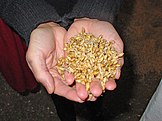The Drink Portal
A portal dedicated to all beverages
Introduction

A drink or beverage is a liquid intended for human consumption. In addition to their basic function of satisfying thirst, drinks play important roles in human culture. Common types of drinks include plain drinking water, milk, juice, smoothies and soft drinks. Traditionally warm beverages include coffee, tea, and hot chocolate. Caffeinated drinks that contain the stimulant caffeine have a long history.
In addition, alcoholic drinks such as wine, beer, and liquor, which contain the drug ethanol, have been part of human culture for more than 8,000 years. Non-alcoholic drinks often signify drinks that would normally contain alcohol, such as beer, wine and cocktails, but are made with a sufficiently low concentration of alcohol by volume. The category includes drinks that have undergone an alcohol removal process such as non-alcoholic beers and de-alcoholized wines. (Full article...)
Selected article -
In the Vedic tradition, sóma (Devanagari: सोम) is a ritual drink of importance among the early Vedic Indo-Aryans. The Rigveda mentions it, particularly in the Soma Mandala. Gita mentions the drink in chapter 9. It is equivalent to the Iranian haoma.
The texts describe the preparation of soma by means of extracting the juice from a plant, the identity of which is now unknown and debated among scholars. Both in the ancient religions of Historical Vedic religion and Zoroastrianism, the name of the drink and the plant are not exactly the same.
There has been much speculation about the most likely identity of the original plant. Traditional Indian accounts, such as those from practitioners of Ayurveda, Siddha medicine, and Somayajna called Somayajis, identify the plant as "Somalata" (Cynanchum acidum). Non-Indian researchers have proposed candidates including Amanita muscaria, Psilocybin mushrooms, Peganum harmala and Ephedra sinica. (Full article...)
Did you know? -
- ... that the relatively low standards of player selection for Somerset County Cricket Club in 1883 have been described as being "determined with a nod and a wink over drinks"?
- ... that an image of MacCarthy's Bar on the front cover of a book featured a staff member posing as a nun drinking a pint of Guinness and the surprise appearance of a dog?
- ... that salt marsh snakes drink only rainwater?
- ... that The Drunkard's Progress suggests that a single social drink leads to poverty, crime, and suicide?
- ... that the Buddha is said to have sat under a charoli tree at Bodh Gaya for seven days without eating, drinking, washing, excreting, or lying down?
- ... that Phil Elverum recorded Don't Wake Me Up nocturnally, while "drinking pots of black tea all night"?
General images -
Selected image -
Selected biography -

Selected quote -
| “ | You can no more keep a martini in the refrigerator than you can keep a kiss there. The proper union of gin and vermouth is a great and sudden glory; it is one of the happiest marriages on earth, and one of the shortest-lived. | ” |
| — Bernard DeVoto Harper's Magazine (December 1949) |
Selected ingredient -
Topics
| General topics: | Bartending • Bottling • Drinking • Drinking water • Bottled water • Mineral water • Coffee • Energy drink • Juice • Tea • Milk • Plant milk • Pasteurization • Refrigeration • Steeping • Water purification |
| Alcoholic beverages: | Beer • Brandy • Brewing • Caffeinated alcoholic drinks • Cider • Cocktails • Distillation • Fermentation • Hard soda • Liquor • Liqueur • Malt drink • Mead • Proof • Rice Wine • Schnapps • Vodka • Whiskey • Wine |
| Soft Drinks: | Carbonation • Cola • Orange soft drink • Frozen carbonated drink • Root beer • Soda water • Lithia water • |
| Miscellaneous: | Drink industry • Lemonade • Limeade • Orange drink • Slush (beverage) |
List articles
Subcategories
Related portals
WikiProjects


WikiProject Food & Drink is an association of Wikipedians with an interest in culinary-related subjects. They have come together to co-ordinate the development of food and drink articles here on Wikipedia as well as the many subjects related to food such as foodservice, catering and restaurants. If you wish to learn more about these subjects as well as get involved, please visit the project.
 WikiProject Beer – covers Wikipedia's coverage of beer and breweries and microbreweries
WikiProject Beer – covers Wikipedia's coverage of beer and breweries and microbreweries
![]() WikiProject Wine – aims to compile thorough and accurate information on different vineyards, wineries and varieties of wines, including but not limited to their qualities, origins, and uses.
WikiProject Wine – aims to compile thorough and accurate information on different vineyards, wineries and varieties of wines, including but not limited to their qualities, origins, and uses.
| Child projects: | Task forces: (All inactive) |
| Related projects: | |
Things you can do
 |
Here are some tasks awaiting attention:
|
Associated Wikimedia
The following Wikimedia Foundation sister projects provide more on this subject:
-
Commons
Free media repository -
Wikibooks
Free textbooks and manuals -
Wikidata
Free knowledge base -
Wikinews
Free-content news -
Wikiquote
Collection of quotations -
Wikisource
Free-content library -
Wikiversity
Free learning tools -
Wiktionary
Dictionary and thesaurus



































































